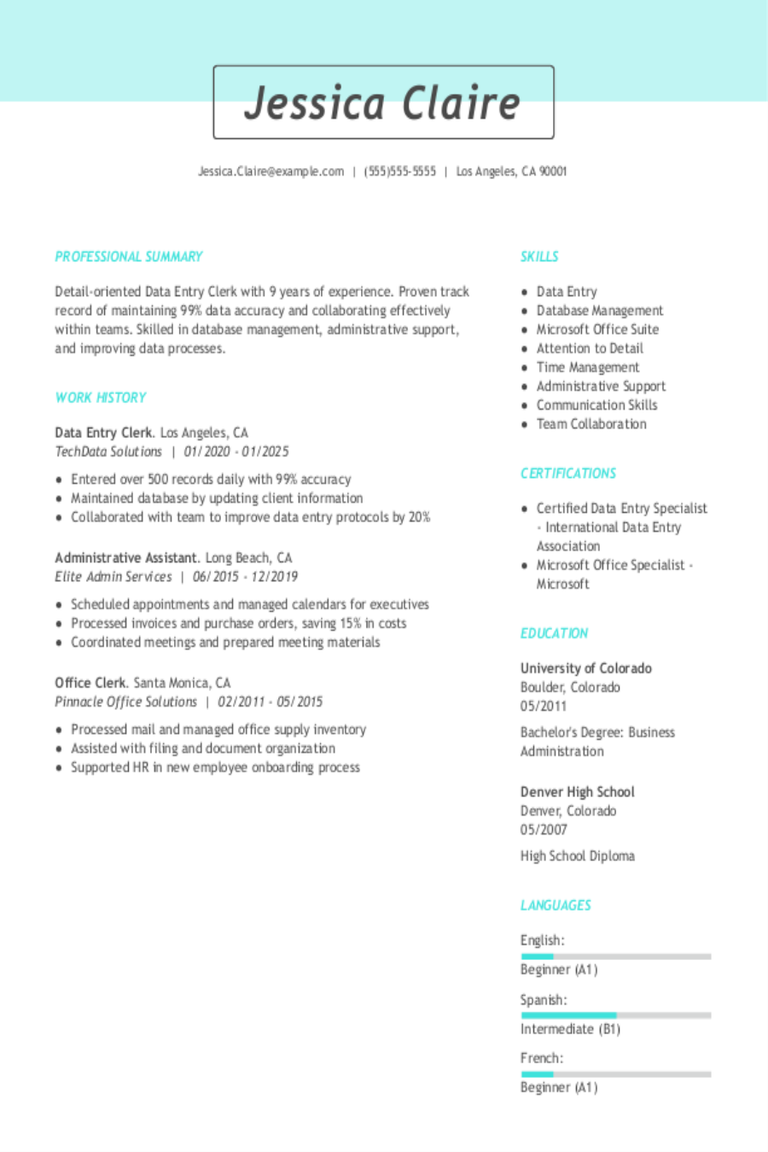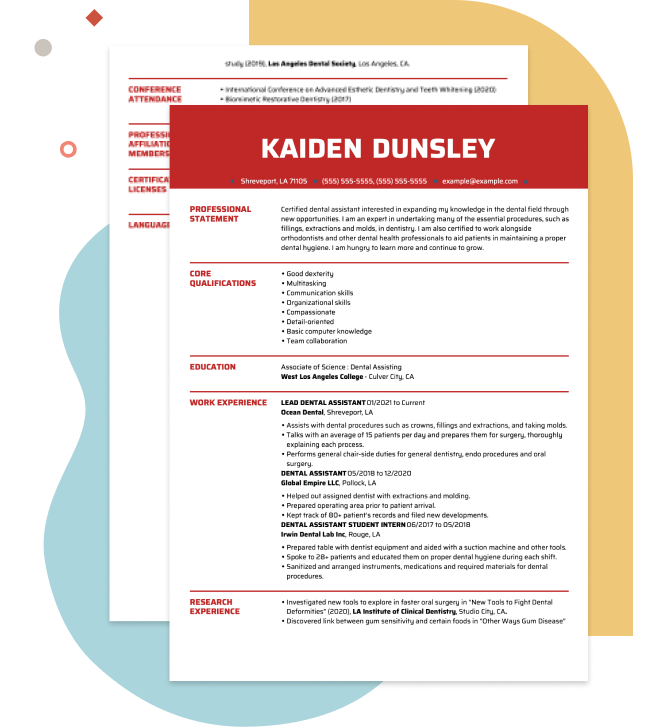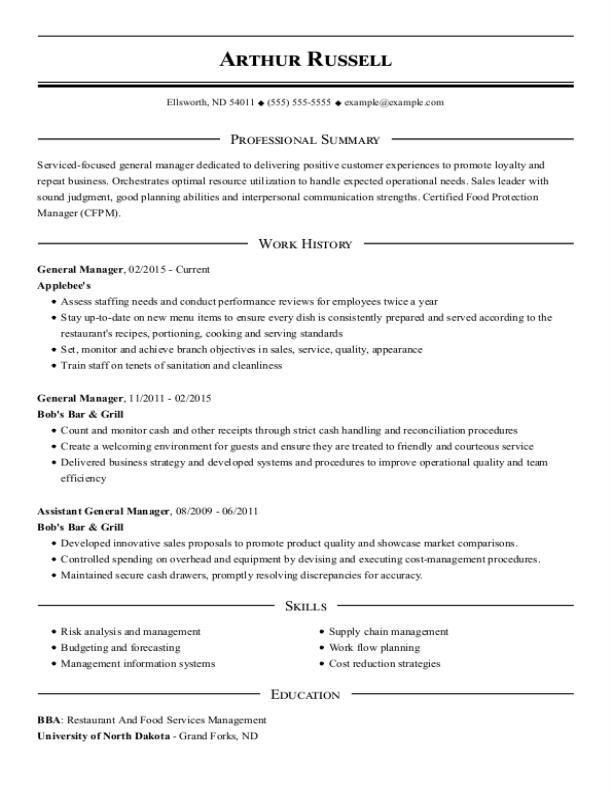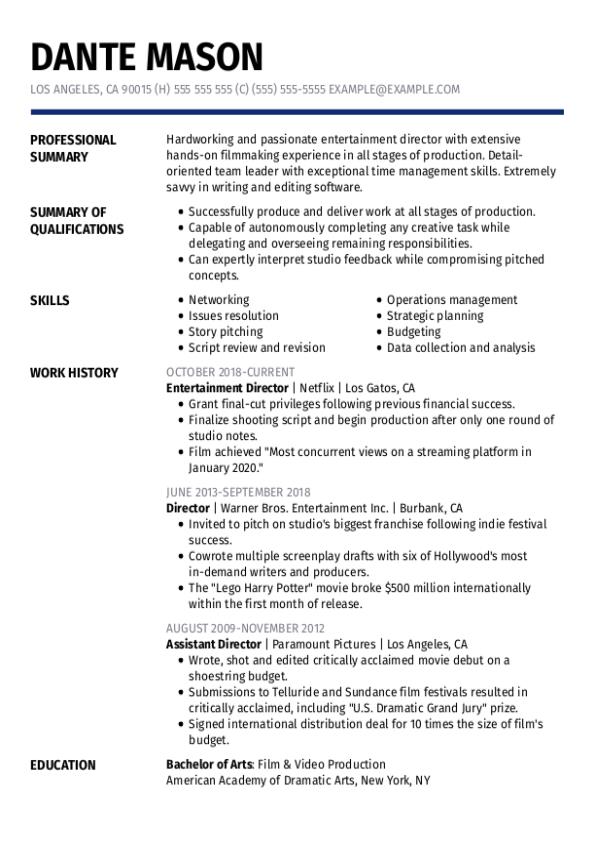Why this resume works
- Quantifies accomplishments: Details quantifiable achievements, such as efficiency improvements, cost savings, and productivity boosts, illustrating the job seeker’s tangible impact.
- Showcases career progression: Career progression is showcased through increasingly responsible roles from office manager to executive assistant, reflecting growth in managing complex tasks and leading larger teams.
- Illustrates problem-solving ability: Problem-solving skills are highlighted by examples of streamlining processes, implementing new systems, and enhancing team performance, demonstrating innovative thinking and resourcefulness.
More Executive Assistant Resume Examples
Our executive assistant resume examples offer great insights into showcasing your organizational, multitasking, and communication skills. Use these administrative resume samples to create a strong resume that highlights essential experience and aligns with various executive support roles.
Data Entry Clerk
Why this resume works
- Features a strong education section: The education section stands out by clearly listing advanced degrees from reputable universities, emphasizing academic excellence that supports early-career professional credibility.
- Touches on accomplishments: Accomplishments such as boosting data efficiency by up to 30% highlight the job seeker’s performance and contributions in past roles.
- Shows digital literacy: Showcases computer skills through responsibilities such as managing calendars and coordinating travel arrangements, reflecting proficiency with modern technical tools necessary in today’s workplace.
Facilities Manager
Why this resume works
- Includes a mix of soft and hard skills: The resume showcases a balanced blend of technical and interpersonal skills, with responsibilities ranging from project coordination to executive communication.
- Demonstrates language abilities: Demonstrates language skills through international travel coordination and cross-cultural team engagements, emphasizing effective global communication.
- Displays technical expertise: Displays proficiency in specialized tools and industry certifications like Certified Facility Manager, underlining the candidate’s technical expertise and commitment to professional development.
Office Manager
Why this resume works
- Showcases impressive accomplishments: The resume impressively showcases accomplishments through specific examples, such as saving 10 hours weekly and reducing costs by 15%, underlining senior-level impact.
- Focuses on work history: The chronological resume format emphasizes extensive work history, ideal for someone with significant career experience.
- Sections are well-organized: Clear headers and bullet points make this resume easy to scan, highlighting key responsibilities and achievements effectively.
Executive Assistant Resume Template (Text Version)
Suki Kim
Brookfield, WI 53013
(555)555-5555
Suki.Kim@example.com
Professional Summary
Highly organized and proactive Executive Assistant with 6 years of diverse experience in administrative roles. Proven track record of optimizing processes, coordinating events, and reducing operational costs. Skilled in calendar management, communication, and data management.
Skills
- Calendar Management
- Event Coordination
- Expense Reporting
- Office Administration
- Communication Skills
- Data Management
- Project Coordination
- Database Management
Certifications
- Certified Administrative Professional (CAP) – International Association of Administrative Professionals
- Project Management Certification – Project Management Institute
Education
Master’s Business Administration
New York University New York, NY
May 2019
Bachelor’s Management
University of California, Berkeley Berkeley, CA
May 2017
Work History
Executive Assistant
PrimeTech Inc. – Brookfield, WI
March 2023 – March 2025
- Managed daily executive schedules.
- Coordinated 25+ events annually.
- Reduced operational costs by 15%.
Administrative Coordinator
Crestwood Enterprises – Brookfield, WI
March 2020 – February 2023
- Streamlined processes, reducing delays by 20%.
- Supervised administrative team of 5 members.
- Optimized client scheduling, improved efficiency.
Office Manager
BrightLeaf Consultants – Milwaukee, WI
March 2019 – February 2020
- Enhanced office efficiency by 10%.
- Implemented new filing system.
- Trained 10 new hires, improved performance.
Languages
- English – Beginner (A1)
- Spanish – Beginner (A1)
- French – Intermediate (B1)
Popular Skills for a Executive Assistant Resume
A strong resume skills section is essential for highlighting the technical and interpersonal abilities necessary for an executive assistant.
This position demands a combination of hard skills, such as organization and software knowledge, and soft skills, such as communication and time management.
Below are a few of the top soft skills frequently listed on executive assistant resumes.
| Soft Skills | % of resumes with this skill |
|---|---|
| Executive support | 52.85% |
| Strong problem solver | 47.91% |
| Meticulous attention to detail | 23.81% |
| Information confidentiality | 23.10% |
| Interpersonal communication | 22.01% |
Here are a few examples of hard skills frequently included on executive assistant resumes.
| Hard Skills | % of resumes with this skill |
|---|---|
| Office management | 46.26% |
| Administrative support | 45.10% |
| Calendar management | 24.26% |
| Advanced Microsoft Office suite | 18.75% |
| Proofreading | 16.67% |
Related Resume Guides
- Assistant Front Office Manager
- Auto Title Clerk
- Bilingual Receptionist
- City Clerk
- Data Entry Clerk
- Document Controller
- Document Specialist
- Excel Professional
- Facilities Manager
- Front Office Assistant
- Gym Receptionist
- Medical Billing And Coding Specialist
- Medical Billing Professional
- Medical Office Assistant
- Medical Receptionist
- Non Profit Administrative Assistant
- Office Assistant
- Office Manager
- Personal Assistant
- Procurement Analyst
- Procurement Specialist
- Receptionist
- Secretary
- Store Assistant
Advice for Writing Your Executive Assistant Resume
Explore our comprehensive tips on how to write a resume tailored to executive assistants. Discover how to highlight your organizational prowess, multitasking abilities, and communication skills to stand out from the competition.
Highlight your most relevant skills
When applying for an executive assistant position, it is essential to highlight your most relevant skills. Listing these skills shows employers that you have the capabilities needed for the job. Create a dedicated skills section in your resume to showcase technical and interpersonal skills.
For example, include hard skills such as proficiency in Microsoft Office, calendar management, and travel planning. Also, mention soft skills like communication, organization, and problem-solving.
To make your resume even stronger, integrate key skills into your work experience section. Describe specific tasks where you used those skills effectively.
For instance, instead of just saying “Managed calendars,” you could say “Efficiently managed calendars for three executives, ensuring no scheduling conflicts.”
This approach not only highlights your abilities but also provides concrete examples of how you’ve successfully applied them in real-world situations.
By balancing and integrating these elements throughout your resume, you’ll present yourself as a well-rounded candidate ready for the executive assistant role.
Identify keywords from the job description and add them to your resume to get past applicant tracking systems (ATS) and impress recruiters.
Showcase your accomplishments
To showcase your accomplishments as an executive assistant, start by organizing your work experience in reverse chronological order.
Each job entry should include your job title, the employer’s name, location, and employment dates. This format helps hiring managers quickly see your career progression and most recent experiences.
Make your resume stand out by quantifying accomplishments rather than just listing duties. Turn tasks into achievements by highlighting measurable results like percentages, time savings, cost reductions, or efficiency improvements.
For example, instead of saying, “Managed executive schedules,” you could say, “Optimized executive schedules to reduce meeting overlaps by 30%.”
Use action-oriented words that focus on core duties and tangible outcomes. Quantified accomplishments help hiring managers assess your impact and skills quickly. They give a clear picture of how you added value in previous roles and can do the same in the future.
For instance, mentioning that you “Implemented a new filing system that increased document retrieval speed by 40%” shows both initiative and effectiveness in problem-solving.
Always aim to present yourself as someone who not only handled responsibilities but also made a significant positive difference in each role.
5 executive assistant work history bullet points
- Coordinated and scheduled over 200 meetings annually, ensuring seamless communication and increasing executive productivity by 15%.
- Managed complex travel arrangements for senior executives, reducing travel costs by 20% through strategic planning and negotiations.
- Developed and maintained an efficient filing system for confidential documents, improving retrieval time by 40%.
- Implemented a new digital task tracking system, enhancing workflow efficiency and reducing missed deadlines by 25%.
- Organized high-profile corporate events with up to 500 attendees, receiving positive feedback from 95% of participants.
Opt for a straightforward resume template featuring clear sections and readable fonts. Limit design elements to ensure employers can easily view your skills and experience.
Write a strong professional summary
A professional summary is a concise statement at the top of your resume that showcases your key skills and experiences. For an executive assistant, it introduces you to potential employers by highlighting your abilities in organization, communication, and executive support. This section should make a strong first impression by quickly demonstrating why you are the best fit for the role.
For experienced candidates, use a professional summary to highlight achievements and relevant experience. For example: “Highly organized Executive Assistant with over 10 years of experience supporting C-level executives. Proven track record in managing schedules, coordinating travel, and handling confidential information efficiently.”
If you have limited work experience, opt for a resume objective instead. Focus on your goals and what you can bring to the role: “Detail-oriented recent graduate seeking an Executive Assistant position to leverage strong organizational skills and passion for administrative support.”
Use action-oriented language like “managed,” “coordinated,” or “supported” to emphasize your skills and impact. Highlighting specific achievements such as improving office efficiency or successfully planning corporate events can make your summary stand out.
Executive assistant resume summary examples
Entry-level
Recent graduate with a bachelor’s degree in business administration and a certification in office management. Strong foundation in administrative support, scheduling, and basic project management. Proficient in MS Office suite and Google Workspace. Eager to bring excellent organizational and multitasking skills to support executive-level staff in achieving business objectives.
Mid-career
Results-driven executive assistant with over 7 years of experience supporting senior executives in the finance industry. Proven track record in managing complex calendars, coordinating international travel, and handling confidential information with discretion. Recognized for enhancing office efficiency through process improvements and exceptional interpersonal skills. Adept at preparing financial reports and assisting with high-stakes presentations.
Experienced
Seasoned executive assistant with 15+ years of experience providing strategic support to C-suite executives within Fortune 500 companies. Expert in executive communication, event planning, and cross-departmental coordination. Demonstrated ability to drive operational excellence through advanced project management skills and proactive problem-solving. Known for fostering strong professional relationships and contributing to executive team success.
Executive assistant resume objective examples
Recent graduate
Detail-oriented and proactive recent graduate with a bachelor’s degree in business administration seeking an executive assistant role to apply strong organizational, communication, and administrative skills. Committed to providing high-level support to executives and contributing to the efficiency of office operations.
Career changer
Resourceful professional transitioning from customer service management into an executive assistant position, bringing excellent multitasking abilities, a keen eye for detail, and robust problem-solving skills. Eager to leverage experience in client relations and administrative support to enhance executive productivity.
Specialized training
Highly organized entry-level candidate with advanced proficiency in Microsoft Office suite and project management software seeking an executive assistant role. Passionate about utilizing exceptional time management and coordination skills to support executive functions and drive organizational success.
Use our Resume Builder to craft your executive assistant resume. It offers easy-to-use templates that help you highlight your skills and experience clearly.
Match your resume to the job description
Customizing your resume to match job descriptions is essential because it helps you stand out to employers and increases your chances of passing through applicant tracking systems (ATS). ATS software scans resumes for specific keywords and phrases from the job posting.
If your resume doesn’t include these terms, it might not get seen by a hiring manager. By aligning your resume with the job description, you demonstrate that you have the skills and experience required for the executive assistant role. See how to make a targeted resume for additional tips and examples.
Read the job posting carefully and highlight key keywords and phrases. Look for terms like “calendar management,” “travel arrangements,” or “confidential correspondence.” Then, incorporate those terms into your resume.
For example, if the job posting mentions “manage executive schedules,” you could reword this into a bullet point on your resume: “Managed executive schedules to ensure timely meetings and appointments.”
List relevant skills prominently near the top of your ATS-friendly resume in a skills section, such as “Proficient in calendar management” or “Experienced with travel coordination.” Organize sections logically with clear headings like Professional Experience, Skills, and Education.
Highlight achievements that demonstrate how you’ve successfully used these skills in past roles. This approach makes your resume more attractive to both ATS software and human reviewers.
Use our ATS Resume Checker to find and fix resume problems so you can get noticed by employers. It helps make sure your resume is clear, easy to read, and ready for job applications.
FAQ
Do I need to include a cover letter with my executive assistant resume?
Including a cover letter with your executive assistant resume is a smart way to strengthen your application. It allows you to spotlight the skills and experiences that make you a strong fit — such as managing demanding schedules, handling sensitive communications, or supporting senior leadership in fast-paced environments.
Using our Cover Letter Generator can help you craft a polished, tailored message that highlights your organizational strengths, attention to detail, and professionalism. Reviewing executive assistant cover letter examples can also offer insight into how to communicate these qualities effectively.
When possible, reference specific aspects of the company or the executive you’ll support to show genuine interest and alignment. Keep your letter concise — just enough to complement your resume while making a confident, memorable first impression. See our professional cover letter examples for additional inspiration.
How long should a executive assistant’s resume be?
The ideal resume length for an executive assistant is one page, especially for those with fewer than 10 years of experience. This keeps it concise and easy for hiring managers to review quickly.
If you have extensive experience or notable achievements, a two-page resume is acceptable. Highlight relevant skills like calendar management, travel coordination, and project support.
Showcase your ability to handle high-pressure situations and maintain confidentiality, key qualities for an executive assistant role. Prioritize recent positions and accomplishments to make the most impact.
How do you write a executive assistant resume with no experience?
When crafting an executive assistant resume with no experience, focus on showcasing your transferable skills, education, and any relevant experiences.
Here are a few tips to help you get started:
- Start with a compelling summary: Write a brief statement that highlights your organizational abilities, attention to detail, and enthusiasm for supporting executives effectively.
- Highlight your education: List your degree(s) and pertinent coursework. If you studied business administration, communication, or office management, be sure to mention those subjects.
- Emphasize transferable skills: Time management, multitasking, proficiency in office software (like Microsoft Office or Google Workspace), and strong written and verbal communication are transferable skills for an executive assistant.
- Include any relevant experience: Even if you haven’t been an executive assistant before, describe roles where you’ve had similar duties, such as managing schedules at a part-time job or coordinating events for a club.
Also, if you’ve completed courses in office administration, project management tools like Asana or Trello, or soft skills training in areas like customer service or conflict resolution, include these to demonstrate your readiness for the role.
Rate this article
Executive Assistant
Additional Resources

Data Entry Clerk Resume Examples & Templates
These data entry clerk resume examples will show you how to highlight your typing speed, accuracy, and attention to detail. Use these tips to create a resume that makes your

Resume Accomplishment Examples & Expert Tips
Don’t just tell potential employers what you did in your previous jobs — show them how good you are at what you do. Employers want to see not just what you

PhD Resume Examples & Templates
A PhD resume is an abstract of your career: a concise summary of your strongest skills, relevant qualifications and educational background. It should present enough information to catch the reader’s

Paralegal Resume Examples + Expert Writing Guide
A paralegal is a legal professional who works under the supervision of a lawyer and helps in various legal tasks. Paralegals work in a variety of settings, including law firms,

General Sales Manager Resume Examples & Templates
General sales managers are responsible for managing a sales team, overseeing sales activities and ensuring that the team meets or exceeds sales targets. They are experienced in managing teams, evaluating

Entertainment Director Resume Examples & Templates
An entertainment director plays a critical role in the production of successful events, bringing together creative teams, talent and logistics to create engaging and memorable experiences for audiences. Browse our expert
